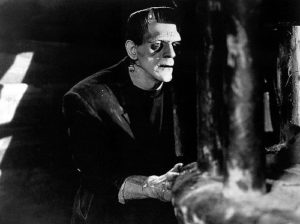 Mary Shelley’s novel Frankenstein is a ubiquitous feature of popular culture, continuously adapted and revisited. Dr. Raymond Boisvert, Professor of Philosophy Emeritus (Siena College), argues that Frankenstein endures because of its sophisticated treatment of morality. Frankenstein is subtitled The Modern Prometheus, a reference to the figure of Greek mythology who steals fire from the gods. Prometheus was an important character to Mary Shelley’s Romantic contemporaries, who often characterized Prometheus as the embodiment of the human quest for knowledge and the transcending of limitations and mundane constraints. The “modern Prometheus” of Shelley’s novel is Victor Frankenstein — the central character after whom the book is named.
Mary Shelley’s novel Frankenstein is a ubiquitous feature of popular culture, continuously adapted and revisited. Dr. Raymond Boisvert, Professor of Philosophy Emeritus (Siena College), argues that Frankenstein endures because of its sophisticated treatment of morality. Frankenstein is subtitled The Modern Prometheus, a reference to the figure of Greek mythology who steals fire from the gods. Prometheus was an important character to Mary Shelley’s Romantic contemporaries, who often characterized Prometheus as the embodiment of the human quest for knowledge and the transcending of limitations and mundane constraints. The “modern Prometheus” of Shelley’s novel is Victor Frankenstein — the central character after whom the book is named.
Evil as the Absence of Good & Evil as Banal
Victor, a brilliant thinker who sees science as a means of transcending natural limits, creates life (Frankenstein’s “monster”) only to demean and abandon his creation. But Boisvert argues that Victor is a complex figure — neither inherently evil, nor the product of a corrupt or evil society. Instead Victor’s failings can better be understood by examining two different ethical models.
 The first model offered by Boisvert by which to view the actions of Victor Frankenstein stems from the philosophical work of St. Augustine, according to which evil is seen as the absence of good. On this account, Victor’s actions are reprehensible (and evil) because he takes no time to cultivate virtue, nor think seriously about the moral ramifications of his experiments. It is not that he has some special capacity for evil, but his inattention and neglect of moral deliberation or action which allow him to behave cruelly.
The first model offered by Boisvert by which to view the actions of Victor Frankenstein stems from the philosophical work of St. Augustine, according to which evil is seen as the absence of good. On this account, Victor’s actions are reprehensible (and evil) because he takes no time to cultivate virtue, nor think seriously about the moral ramifications of his experiments. It is not that he has some special capacity for evil, but his inattention and neglect of moral deliberation or action which allow him to behave cruelly.
The second model offered by Boisvert derives from the work of philosopher Hannah Arendt. Rather than evil as absence, Arendt appeals to the notion of evil as banal. Arendt’s philosophical contributions about the “banality of evil” came from observing the trial of Nazi war criminal, Adolf Eichmann. Arendt found nothing remarkable about his character, no personality disorders or fanaticism. From this, Arendt claimed that people do not need an innate tendency to behave wickedly; “normal” people can commit atrocities if they think in lazy cliches and their behavior is socially acceptable or even rewarded. Victor is a normal man from a respectable family; he is not a monster like his creation, but he follows the model of “evil as banal” by refusing to face his own culpability and responsibility, and by ignoring the evidence of his cruelty.
Phronesis & Morality
Boisvert claims that these two systems of absence and banality work in concert with Victor’s Promethean impulse, causing him to disregard necessary boundaries and limitations that define humanity.
[The failings of Victor result] from a basic absence associated with the Promethean spirit: a lost sensitivity to human limits…What emerges is anything but Promethean success; rather, a shrunken version of what Victor could have been, a transformation of him into an increasingly isolated figure dominated by vengefulness. His actions are wicked and reprehensible. His path toward them, by contrast, is rather pedestrian. Here is where absence and banality help us understand evil. There is no need to look for evil elsewhere. Its possibility lies within each of us; even within someone with all the advantages of a Victor Frankenstein. – Raymond D. Boisvert
Shelley contrasts Victor Frankenstein with Captain Walton, the character who serves as a kind of narrator through his letters and who finds Victor in the north pole. At first Walton might seem very similar to Victor — Walton is also a man of great ambition who takes a dangerous path and demands much of his crew. However, Walton is a foil to the singular ethic of Victor, and differs in his appreciation of human limits and the needs of others.
Victor’s Prometheanism sets him apart from Walton. A ‘modern Prometheus’ believes himself above what phronesis seeks to discern: criteria, norms, warnings from one’s circumstances. A Prometheus fixated on fame and greatness would also dismiss the importance of flexibility and balance, thus blocking ancient philosophy’s goal of achieving the best proportions among multiple goods. – Raymond D. Boisvert
Boisvert defines Walton as a man of “practical wisdom” or the greek virtue of phronesis. Where Victor seeks to transcend petty considerations, Walton is thoughtful and prudent, taking time to consider his choices. Walton decides to cut his journey short so as not to kill his remaining crew; this inspires Victor to chastise the crew for their insufficient commitment as he believes one must be singularly devoted to achieve greatness. Victor does not transcend the boundaries of his society as much as he transcends the limits of his own conscience, and serves as a reminder to consider one’s actions carefully instead of blindly charging toward personal glory.
